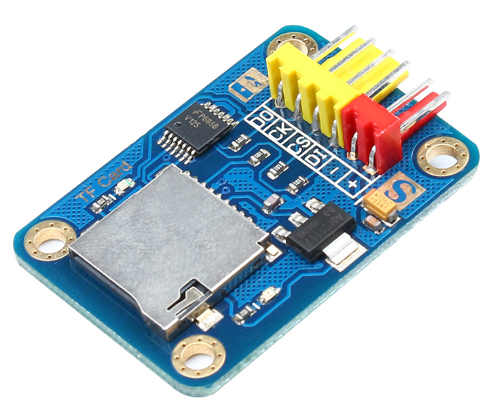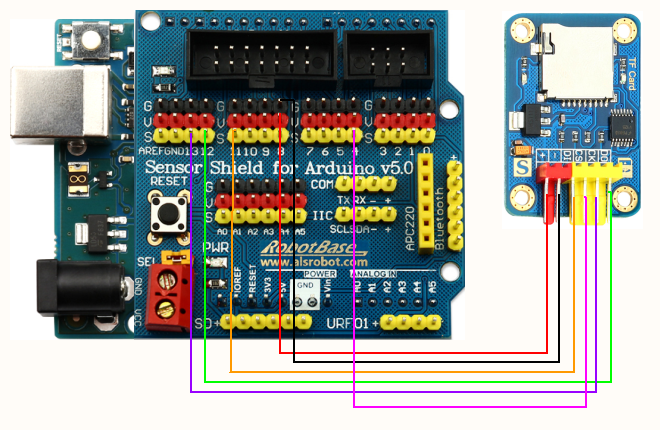SKU:RB-02S018A TF卡读写模块
目录 |
产品概述
该模块(MicroSD Card Adapter)是Micro SD卡读写模块,通过文件系统及SPI接口驱动程序,单片机系统即可完成MicroSD卡内的文件进行读写。Arduino用户可直接使用Arduino IDE自带的SD卡程序库即可完成卡的初始化和读写。
模块特点如下:
- 支持Micro SD卡、Micro SDHC卡(高速卡)
- 板载电平转换电路,即接口电平可为5V或3.3V
- 供电电源为4.5V - 5.5V,板载3.3V稳压电路
- 通信接口为标准SPI接口
- 4个M2螺丝定位孔,便于安装
规格参数
- 工作电压:3.3V - 5V
- 产品尺寸:40mm * 28mm
- 重量大小:3g
- 信号类型:模拟信号
- 固定孔:M3 * 4个
- 通信接口:标准 SPI 接口
- 支持卡类型:Micro SD 卡(< = 2G),Micro SDHC 卡(< = 32G)
- 电源指示灯:红色
- 数据传输指示灯:蓝色
10.接口定义
- + :电源正
- - :电源地
- DI :串行数据输入
- DO :串行数据输出
- CK :串行时钟
- CS :片选信号,由控制器进行控制
工作原理
TF 卡模块使用 SPI 总线连接方式实现与 Arduino 控制器的通信,稳压芯片输出的 3.3V 为电平转换芯片、Micro SD 卡进行供电,电平转换电路往 Micro SD 卡方向的信号转换成 3.3V,Micro SD 卡往控制接口方向的 MISO 信号也转换成了 3.3V,一般 AVR 单片机系统都可以读取该信号,产品使用自弹式卡座,方便卡的插拔。
注意:Arduino 的 sd.h 库文件目前对 2G 及其以下的支持比较好,对 2G 以上的支持不好,所以在使用时,建议选用 2G 或以下的内存卡。
编程原理
TF 卡模块共引出 6 个引脚,其中 DO、CK、DI 是 SPI 总线接口,“+”为电源正,“-”为电源 GND,CS 为片选端,实际使用时依照下面的接线图连接即可,使用 Arduino IDE 自带的例子程序就可以进行测试。
使用方法
example1_Arduino
- 主要硬件
- Arduino UNO 控制器
- 传感器扩展板 V5.0
- TF卡读写模块
- 单头防插反 3P 传感器连接线
- USB 数据线
- 硬件连接
- 例子程序
/*
* TF 卡模块与 Arduino UNO的接线
DI -- D11
CS -- D10
CK -- D13
DO -- D12
*/
#include <SPI.h>
#include <SD.h>
Sd2Card card;
SdVolume volume;
SdFile root;
const int chipSelect = 4;
void setup() {
Serial.begin(9600);
while (!Serial) {
;
}
Serial.print("\nInitializing SD card...");
if (!SD.begin(4)) {
Serial.println("initialization failed");
return;
}
Serial.println("Wiring is correct and a card is present.");
if (!card.init(SPI_HALF_SPEED, chipSelect)) {
Serial.println("initialization failed. Check: SD Card");
return;
} else {
Serial.println("============= Card Information ==================");
}
Serial.print("Card type: ");
switch (card.type()) {
case SD_CARD_TYPE_SD1:
Serial.println("SD1");
break;
case SD_CARD_TYPE_SD2:
Serial.println("SD2");
break;
case SD_CARD_TYPE_SDHC:
Serial.println("SDHC");
break;
default:
Serial.println("Unknow");
}
if (!volume.init(card)) {
Serial.println("Could not find FAT16/FAT32 partition.");
return;
}
// 顯示類型和 FAT 空間大小
uint32_t volumesize;
Serial.print("Volume type is FAT");
Serial.println(volume.fatType(), DEC);
Serial.println();
volumesize = volume.blocksPerCluster(); // clusters are collections of blocks
volumesize *= volume.clusterCount(); // we'll have a lot of clusters
volumesize *= 512; // SD card blocks are always 512 bytes
Serial.print("Volume size (bytes): ");
Serial.println(volumesize);
Serial.print("Volume size (Kbytes): ");
volumesize /= 1024;
Serial.println(volumesize);
Serial.print("Volume size (Mbytes): ");
volumesize /= 1024;
Serial.println(volumesize);
Serial.println("\nFiles found on the card (name, date and size in bytes): ");
root.openRoot(volume);
root.ls(LS_R | LS_DATE | LS_SIZE);
Serial.println("================= Finished =====================");
}
void loop(void) {
}
- 程序效果
程序编译上传无误之后,将准备好的 TF 卡插入到模块中,连接 TF 卡模块和 Arduino UNO 控制器,连接正常情况下,会显示出卡的信息,如下图所示:
example2_Arduino
- 主要硬件
- Arduino UNO 控制器
- 传感器扩展板 V5.0
- TF卡读写模块
- 单头防插反 3P 传感器连接线
- USB 数据线
- 硬件连接
- 例子程序
/*
* TF 卡模块与 Arduino UNO的接线
DI -- D11
CS -- D10
CK -- D13
DO -- D12
*/
#include <SPI.h>
#include <SD.h>
File myFile;
//设置功能变量
Sd2Card card;
SdVolume volume;
SdFile root;
const int chipSelect = 4;
void setup() {
Serial.begin(9600);
while (!Serial) {
}
//----------- 写入文档
Serial.print("\nWaiting for SD card ready...");
if (!SD.begin(4)) {
Serial.println("Fail!");
return;
}
Serial.println("Success!");
myFile = SD.open("card.txt", FILE_WRITE); // 开启文档,一次只能开启一个文档
if (myFile) { // 如果文档正常
Serial.print("Write to card.txt...");
myFile.println("Test to write data to SD card..."); // 继续写在文档的后面
myFile.close(); // 关闭文档
Serial.println("Completed!");
} else {
Serial.println("\n open file error "); // 无法打开文档时,打印“open file error”
}
//----------- 显示SD卡信息
if (!card.init(SPI_HALF_SPEED, chipSelect)) {
Serial.println("initialization failed. Check: SD Card");
return;
} else {
Serial.println("============= Card Information ==================");
}
// 显示 SD 卡类型
Serial.print("Card type: ");
switch (card.type()) {
case SD_CARD_TYPE_SD1:
Serial.println("SD1");
break;
case SD_CARD_TYPE_SD2:
Serial.println("SD2");
break;
case SD_CARD_TYPE_SDHC:
Serial.println("SDHC");
break;
default:
Serial.println("Unknow");
}
if (!volume.init(card)) {
Serial.println("Could not find FAT16/FAT32 partition.");
return;
}
// 显示类型和FAT空间的大小
uint32_t volumesize;
Serial.print("Volume type is FAT");
Serial.println(volume.fatType(), DEC);
Serial.println();
volumesize = volume.blocksPerCluster();
volumesize *= volume.clusterCount();
volumesize *= 512;
Serial.print("Volume size (bytes): ");
Serial.println(volumesize);
Serial.print("Volume size (Kbytes): ");
volumesize /= 1024;
Serial.println(volumesize);
Serial.print("Volume size (Mbytes): ");
volumesize /= 1024;
Serial.println(volumesize);
Serial.println("\nFiles found on the card (name, date and size in bytes): ");
root.openRoot(volume);
// 列出卡内所有文件及 SD 卡的尺寸
root.ls(LS_R | LS_DATE | LS_SIZE);
Serial.println("================= Finished =====================");
}
void loop() {
}
- 程序效果
程序编译上传无误之后,将准备好的 TF 卡插入到模块中,连接 TF 卡模块和 Arduino UNO 控制器,连接正常情况下,会显示出卡的信息,如下图所示:
产品相关推荐
资料下载
网盘链接:https://pan.baidu.com/s/1HbSK4SZSQUO3_0sXgpiGZA 密码:z3gc
产品购买地址
Arduino TF卡读写存储模块:http://www.alsrobot.cn/goods-782.html





